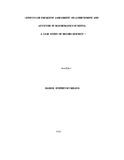Effects of frequent assessment on achievement and attitude in mathematics in Kenya:A case study of Migori district

View/
Date
2014-09-15Author
Kishiano, Hamisi Stephen
Language
enMetadata
Show full item recordAbstract
The purpose of the study was to establish whether frequent mathematics assessment
enables the learner to achieve high scores in form four. Most schools are employing this
method yet they are not sure whether performance in mathematics can improve on using
frequent testing. The findings will enable the teachers to employ those methods that have
positive effects on the performance of learner and avoid those that are not fruitful to the
learners in motivating high achievement in mathematics.
The researcher selected semor mathematics teachers and form students from public
schools in Migori District. The sample was determined using simple random sampling
technique recommended by Krejcie, 1970 (Appendix 4).
The instrument that the researcher .ised was a questionnaire for each selected student and
the senior mathematics teacher in every school. The questionnaire consisted of closed
ended questions to collect the primary data. Questionnaires were preferred by the
researcher because they are relatively cheap, it is free from bias of the interviewer, the
respondents have adequate times to give a well thought out answer to the question and
communication to respondent is easier through a questionnaire.
The questionnaire was administered by the researcher. The study established that frequent
assessment leads to improved performance at KCSE level. Most of the respondent
strongly agreed that frequent assessment leads to higher achievement. Roediger and
vi
Karpicke (2006) have stated hat frequent testing has a positive effect on retention and
thus leads to high achievement.
This study established that frequent assessment reduces anxiety when sitting for exams
and this leads to high achievement in mathematics. Dustin (1971) showed that students
anxiety decreased in where frequent assessment was used. Also Dempster (1992) stated
that frequent short testing tends to significantly reduce students anxiety. The studies
completelyagree with the findings in this study that frequent assessment reduces anxiety
in exams leading to high achievement.
This study hypothesized that frequent assessment leads to high achievement in
mathematics. The findings supported the hypothesis. If frequent assessment reduces
anxiety then this leads to better performance at KCSE. According to responses from the
respondents frequent assessment leads to better performance.
Sponsorhip
University of NairobiSubject
effects of frequent assessment on achievementattitude in mathematics
a case study of Migori district
Description
master of education
Collections
- Faculty of Education (FEd) [6066]
